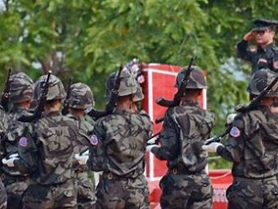In a significant development, the Arakan Army, an ethnic armed group in Myanmar, has reportedly taken control of a town near the border with India and Bangladesh, declared on Sunday (14 January). The town, located in Myanmar’s Rakhine State, has been a focal point of escalating tensions between the Arakan Army and the Myanmar military. The latest incident has raised concerns about the security situation in the region and its potential impact on neighboring countries. 
The Arakan Army, which is fighting for greater autonomy for the ethnic Rakhine population, has been engaged in a protracted conflict with the Myanmar military. The group’s takeover of the town marks a significant shift in the dynamics of the conflict and has raised fears of further violence and instability in the region.
Regional Implications and Cross-Border Concerns
The takeover of the town by the Arakan Army has significant implications for neighboring countries, particularly India and Bangladesh. The porous nature of the border in this region raises concerns about the potential spillover of violence and the influx of refugees into neighboring territories. Both India and Bangladesh have been closely monitoring the situation and have expressed their commitment to upholding peace and stability in the region.
For India, which shares a long and porous border with Myanmar, the developments in Rakhine State are of particular concern. The Indian government has been actively engaged in efforts to address the security challenges along the border and has been working closely with Myanmar to enhance border management and security cooperation. The recent takeover by the Arakan Army underscores the need for continued vigilance and cooperation between the two countries to prevent any adverse impact on their shared border.
Similarly, Bangladesh, which also shares a border with Rakhine State, is closely monitoring the situation. The country has been grappling with the Rohingya refugee crisis, and any escalation of violence in Rakhine State could have far-reaching humanitarian and security implications for Bangladesh. The government of Bangladesh has reiterated its commitment to working with Myanmar and other stakeholders to address the root causes of the conflict and to ensure the safety and security of all communities in the region.
Arakan Army and Conflict Resolution
Amidst the escalating tensions, there have been renewed calls for dialogue and conflict resolution to address the grievances of the ethnic communities in Rakhine State. The protracted conflict between the Arakan Army and the Myanmar military has taken a heavy toll on the civilian population, leading to displacement, loss of life, and widespread suffering. The international community has urged all parties to engage in meaningful dialogue to find a peaceful and sustainable resolution to the conflict.
Efforts to facilitate peace talks and negotiations between the Arakan Army and the Myanmar government have gained urgency in light of the recent developments. The need for a comprehensive and inclusive approach that addresses the underlying grievances of the ethnic communities and promotes reconciliation and development in Rakhine State has been underscored by various stakeholders.
As tensions continue to simmer in Rakhine State, it is imperative for all parties to prioritize dialogue and diplomacy as a means to achieve lasting peace and stability in the region. The international community, including neighboring countries, stands ready to support efforts aimed at finding a peaceful resolution to the conflict and addressing the humanitarian needs of the affected population.
Effect on India-Bangladesh
The Arakan Army’s recent takeover of a town in Myanmar’s Rakhine State, near the borders of India and Bangladesh, has raised significant concerns for both countries. India, sharing a porous border with Myanmar, is proactively addressing security challenges and enhancing cooperation with Myanmar. Bangladesh, already grappling with the Rohingya refugee crisis, is closely monitoring the situation, as any escalation could have humanitarian and security implications. Both countries are committed to maintaining regional peace and stability. However, the situation remains fluid and complex, and for the most accurate information, it’s recommended to refer to reliable news sources.
In conclusion, the takeover of a town by the Arakan Army near the border with India and Bangladesh has heightened concerns about the security situation in Myanmar’s Rakhine State. The implications of these developments extend beyond national borders, underscoring the need for concerted efforts to address the underlying causes of the conflict and prevent any spillover effects. It is imperative for all stakeholders to prioritize dialogue and conflict resolution as a means to achieve lasting peace and stability in the region.












Comments 1